Express Basics
Express in Concrete CMS
Express in Concrete CMS builds complex, relational database objects using Concrete attributes. It offers a simple API and handles relationships between objects with less overhead than using pages. If you've custom-built objects in Concrete websites, Express could streamline your process.
Creating Express Objects in Concrete CMS
Create Express objects in the Concrete CMS Dashboard by:
- Naming the object:
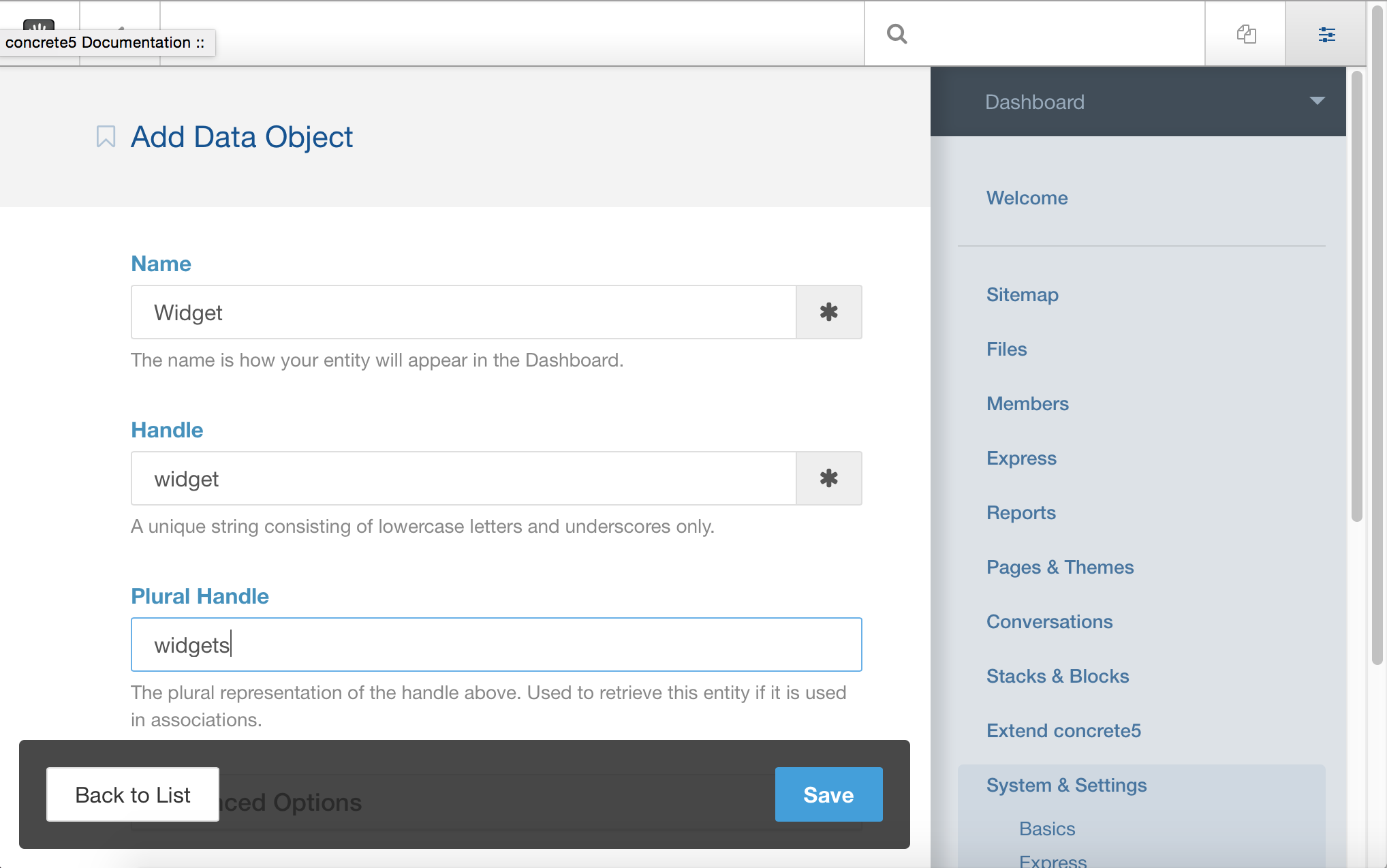
- Adding attributes:
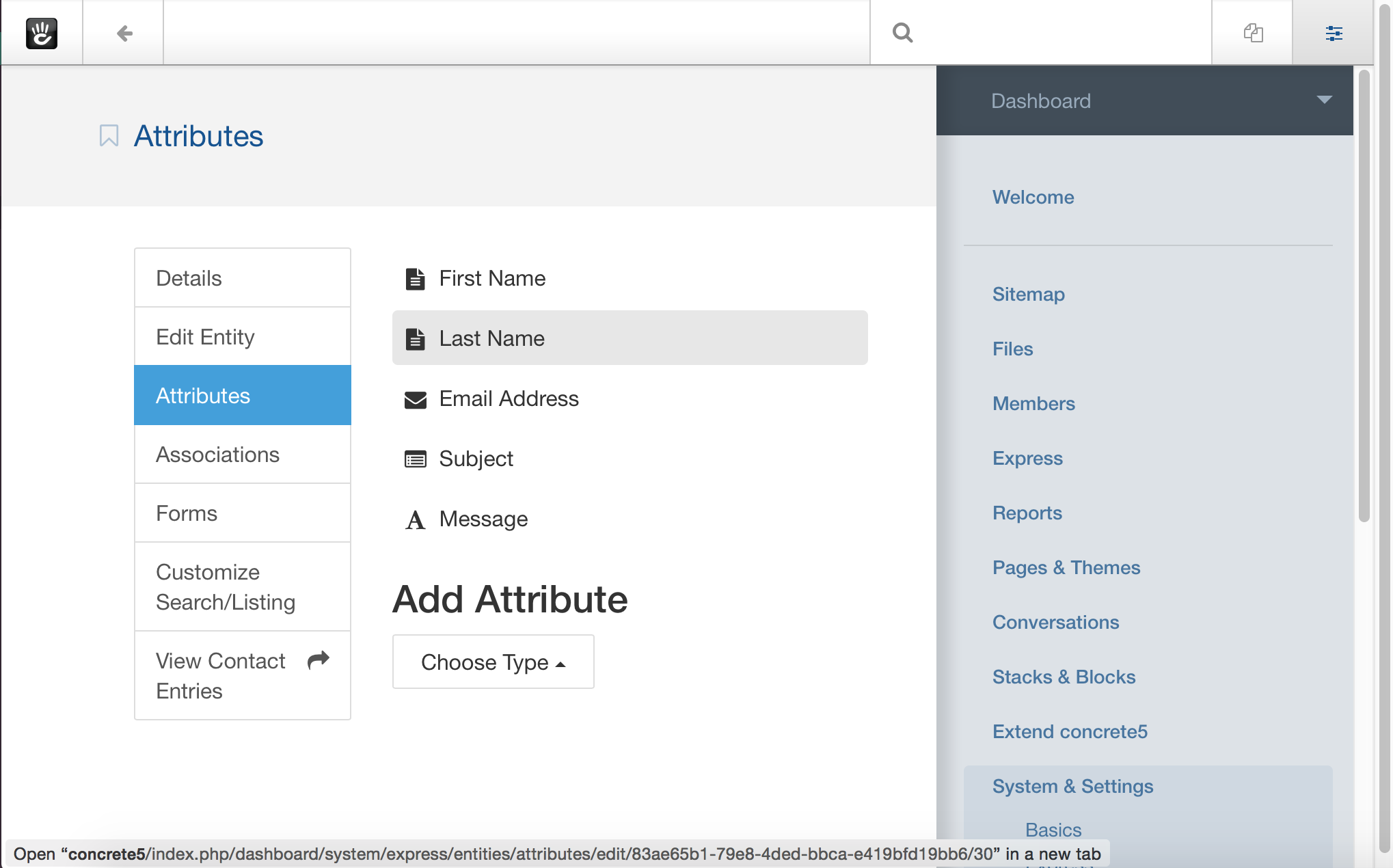
- Setting up a form:
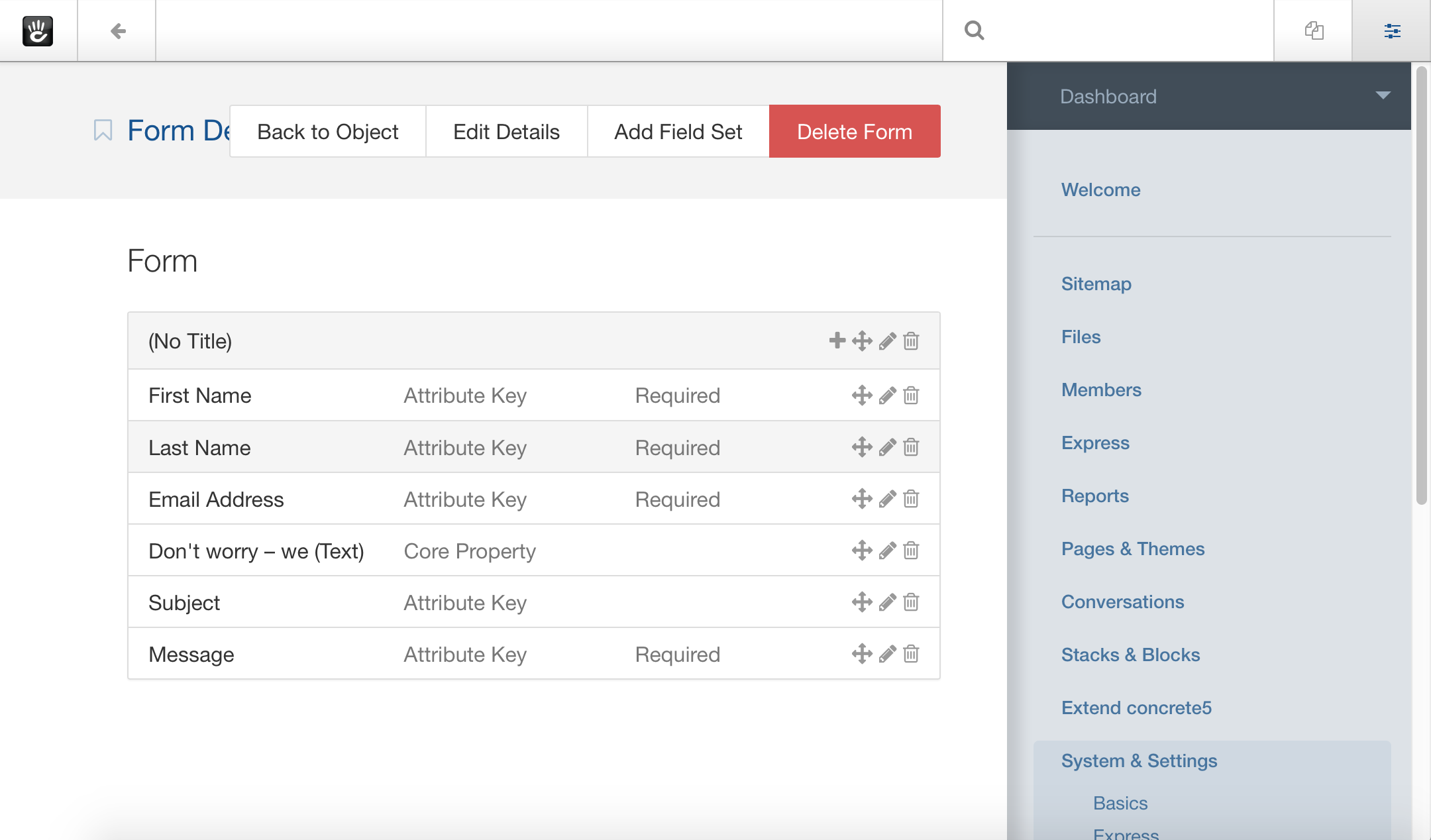
Using the Express Entry Block to Output Entry Data
This section covers how to showcase data from Express entries - specifically illustrating with an example of Marinas and Boats
Step-by-Step Implementation
Linking Marina Pages with Express Entries: Create a custom page attribute to associate each Marina entry with its respective frontend page.
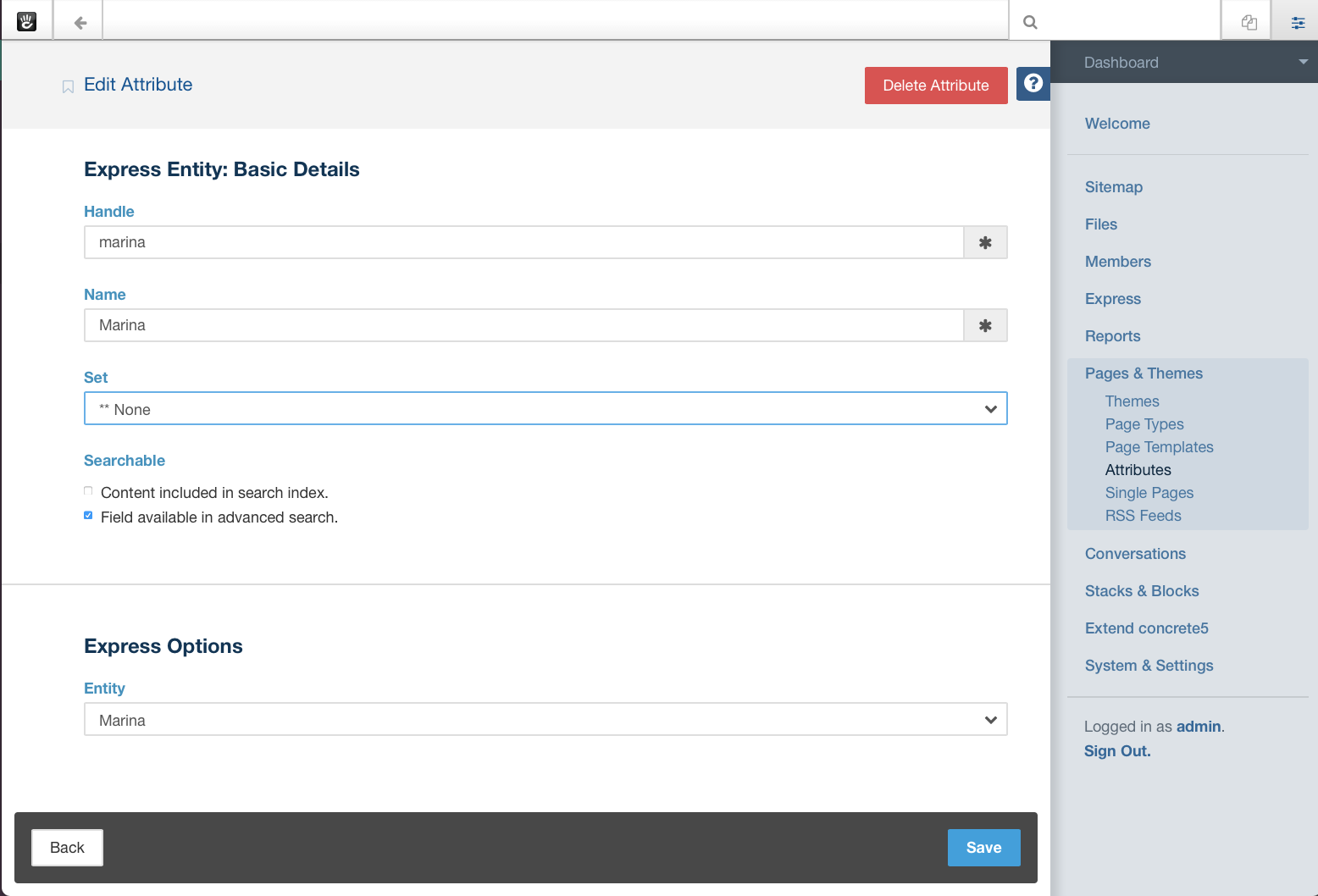 Apply this attribute to the relevant pages:
Apply this attribute to the relevant pages:

Adding Express Detail Block on Marina Pages: Insert an Express Entry Detail block on each Marina page, configured to reference the custom attribute.
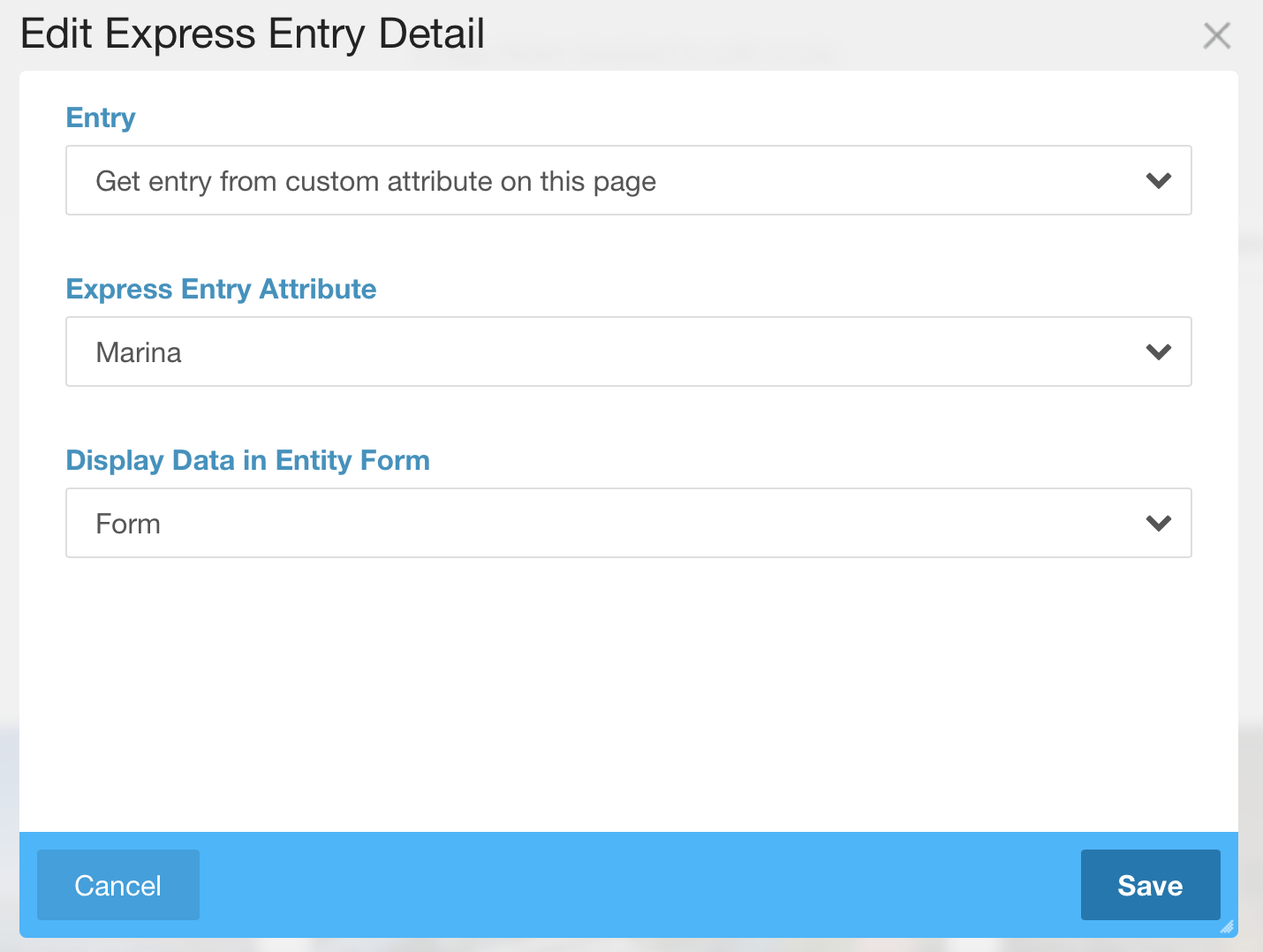
Custom Template for Displaying Boat Data: Develop a custom template for the block to exhibit details about boats associated with each marina.
- Example of the custom template code:
php <?php if (isset($entry) && is_object($entry)) { $boats = $entry->getBoats(); // Table structure and data display code } ?>
- Example of the custom template code:
Creating Custom Block View Templates
For guidance on creating custom block view templates, click here.
This example demonstrates the flexibility of Concrete CMS in handling relational data through Express entities, leveraging magic methods for dynamic interaction with custom attributes and associations in an RDBMS environment.
Creating Express Objects Programmatically in Concrete CMS
This guide details how to programmatically create Express Objects in Concrete CMS, specifically for developers building Concrete packages.
Package Setup for Express Objects
Ensure you're familiar with Concrete package creation as described here before proceeding.
Building the Express Object
Initializing Object Builder: Import Express facade in
controller.php:use Express;Then initialize the Object Builder in
install()method:public function install() { $pkg = parent::install(); $object = Express::buildObject('marina', 'marinas', 'Marina', $pkg); }Adding Attributes: For adding custom attributes like 'Name' and 'Address':
$object->addAttribute('text', 'Name', 'marina_name'); $object->addAttribute('address', 'Address', 'marina_address');For custom attribute settings (e.g., limiting countries):
$settings = new \Concrete\Core\Entity\Attribute\Key\Settings\AddressSettings(); $settings->setCustomCountries(array("US","UK")); $settings->setHasCustomCountries(true); $settings->setDefaultCountry("UK"); $object->addAttribute('address', 'Address', 'marina_address', $settings);Saving the Object: Finalize and save the object:
$object = $object->save();
Adding Associations
Create and save associations between Express Objects, like Marina and Boat:
$marina = Express::buildObject('marina', 'marinas', 'Marina', $pkg);
$boat = Express::buildObject('boat', 'boats', 'Boat', $pkg);
$builder = $marina->buildAssociation();
$builder->addOneToMany($boat);
$boat = $builder->save();
$marina = $marina->getEntity();
Building Express Object Forms
Create an Express form with attributes and field sets:
$student = Express::buildObject('student', 'students', 'Student', $pkg);
// Add attributes
$studentEntity = $student->save();
$form = $student->buildForm('Form');
$form->addFieldset('Basics')
->addAttributeKeyControl('first_name')
->addAttributeKeyControl('last_name')
->addTextControl('', 'This is just some basic explanatory text.')
->addAttributeKeyControl('bio');
$form = $form->save();
Set the default view and edit forms for the Express object:
$entityManager = $student->getEntityManager();
$studentEntity->setDefaultViewForm($form);
$studentEntity->setDefaultEditForm($form);
$entityManager->persist($studentEntity);
$entityManager->flush();
This documentation enables developers to leverage Concrete CMS for creating Express Objects and managing relational data programmatically, ideal for package development.
Express Entry Management: Creating, Reading, Searching, Updating, Deleting
Creating Express Entities
Prerequisite: Package Installation
To add Express Objects in install() method of a Package, follow instructions in the package creation documentation and Express Object Builder documentation. For instance, creating a student entity:
$student = Express::buildObject('student', 'students', 'Student');
$student->addAttribute('text', 'First Name', 'student_first_name');
$student->addAttribute('text', 'Last Name', 'student_last_name');
$student->addAttribute('textarea', 'Bio', 'student_bio');
$student->addAttribute('address', 'Address', 'student_contact_address');
$student->save();
Using the Express Entry Builder
Import Express facade in your package's controller.php, then use the Concrete\Core\Express\EntryBuilder in the install() method:
use Express;
// Within install() method
$address = new \Concrete\Core\Entity\Attribute\Value\Value\AddressValue();
$address->setAddress1('123 SW Test');
$address->setCity('Portland');
$address->setStateProvince('OR');
$address->setPostalCode('97200');
$entry = Express::buildEntry('student')
->setStudentFirstName('Andrew')
->setStudentLastName('Embler')
->setStudentContactAddress($address)
->save();
Adding Associations
Create Teacher object and associate with Student entries:
$teacher = Express::buildObject('teacher', 'teachers', 'Teacher');
$teacher->addAttribute('text', 'First Name', 'teacher_first_name');
$teacher->addAttribute('text', 'Last Name', 'teacher_last_name');
$teacher = $teacher->save();
// Create student entries
$student1 = Express::buildEntry('student')
->setStudentFirstName('Andrew')
->setStudentLastName('Embler')
->save();
$student2 = Express::buildEntry('student')
->setStudentFirstName('Jane')
->setStudentLastName('Doe')
->save();
$teacher = Express::buildEntry('teacher')
->setTeacherFirstName('Albert')
->setTeacherLastName('Einstein')
->save();
// Associate entries
$teacher->associateEntries()->setStudents([$student1, $student2]);
Reading Express Entry Data
Retrieve attribute data:
print $entry->getTeacherFirstName();
$value = $entry->getAttributeValueObject('teacher_first_name');
Retrieve associated entries:
$students = $teacher->getStudents();
foreach($students as $student) {
print $student->getStudentFirstName();
}
$teacher = $student->getTeacher();
print $teacher->getTeacherFirstName();
Retrieving Entry Lists
Listing Entries
Retrieve student Express object, then list entries:
$entity = Express::getObjectByHandle('student');
$list = new Concrete\Core\Express\EntryList($entity);
$students = $list->getResults();
Filtering Lists
Filter by attribute:
$list->filterByStudentFirstName('Andrew');
$results = $list->getResults();
Filter by association:
$entity = Express::getObjectByHandle('medium');
$list = new EntryList($entity);
$languageEntry = Express::getEntry(10);
$association = $entity->getAssociation('medium_language');
$list->filterByAssociatedEntry($association, $languageEntry);
$entries = $list->getResults();
Retrieving an Entry by ID
Retrieve an entry and its attributes:
$student = Express::getEntry(1);
print $student->getFirstName();
$teacher = $student->getTeacher();
print $teacher->getTeacherFirstName();
Sorting Entry Lists
Sort using attribute names:
$list = new Concrete\Core\Express\EntryList($entity);
$list->sortByStudentFirstName('desc');
$result = $list->getResults();
Updating Entries
Modify and refresh entry attributes:
$student = Express::getEntry(1);
$student->setStudentFirstName('Andy');
$student->setAttribute("student_first_name", "Andy");
$student = Express::refresh($student);
print $student->getStudentFirstName();
Update associations:
$student->associateEntries()->setTeacher(null);
Deleting Entries
Delete an Express entry:
Express::deleteEntry($student->getID());
This procedure ensures the removal of all attribute values and associations.